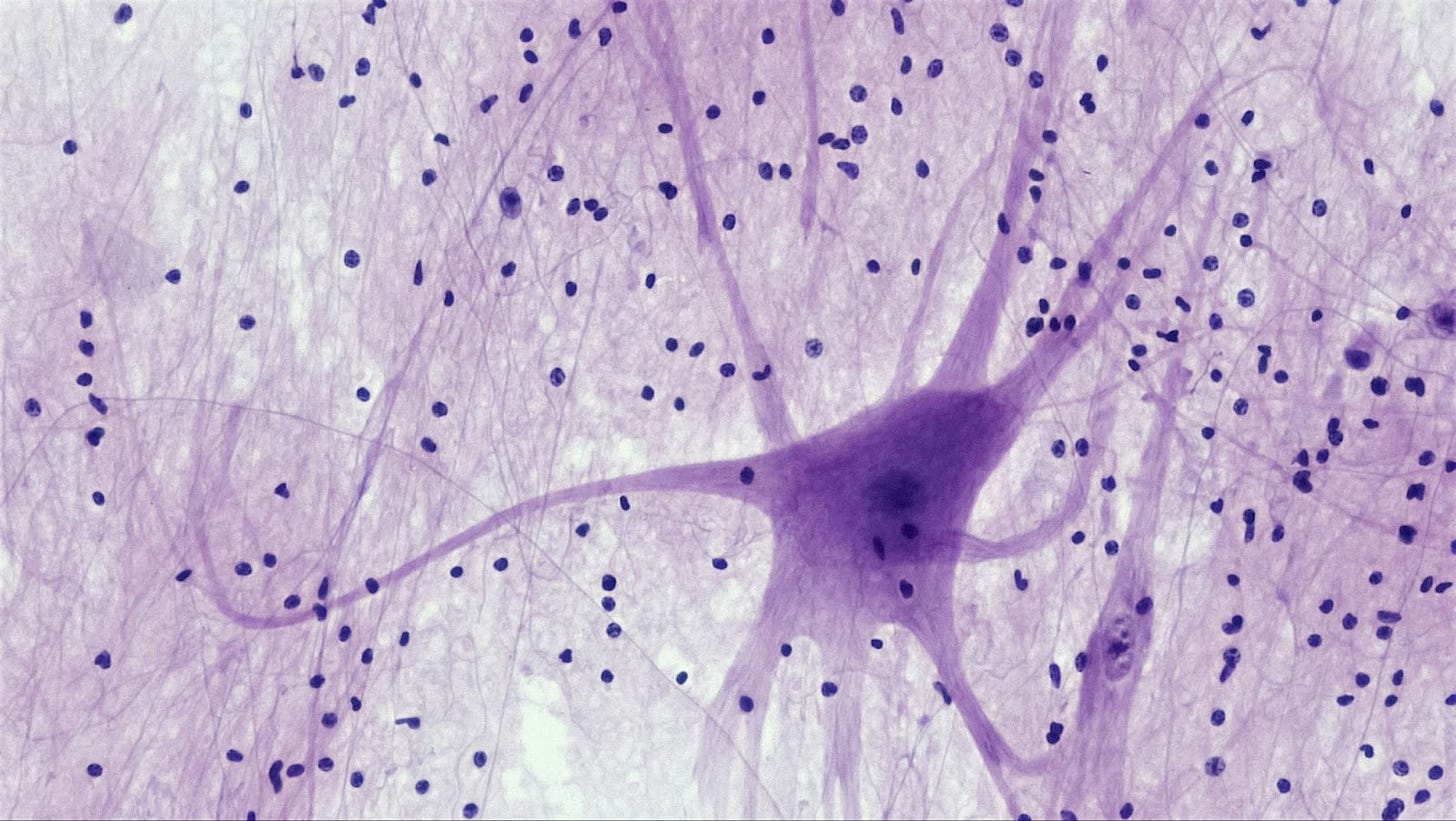#116: 🏢 Non-Profit Organizations Are the Hidden Heroes Advancing Psychedelic Science
Why Mission-Driven Organizations Take on Research Others Won't
Hey Friends,
Are you in Lisbon next week?
Join me and my Longevity Wednesdays community to celebrate the last days of Dry January with a non-alcoholic cocktail tasting on Jan 29th.
💬 In this note:
🏢 Non-Profit Organizations Are the Hidden Heroes Advancing Psychedelic Science
🎧 DOAC: The Happiness Expert
⚡️ Physical Exercise Helps Neurons Grow
🏢 Non-Profit Organizations Are the Hidden Heroes Advancing Psychedelic Science

Quick Summary: Non-profit organizations are the unsung heroes pushing psychedelic science forward. These organizations are stepping in where others won't, funding "risky" but promising research. They're fighting an uphill battle against strict regulations and funding challenges. Three major players - MAPS, the OPEN Foundation, and the Champalimaud Foundation are non-profits tackling everything from psychedelics for PTSD treatment to education to the neuroscience of psychedelics.
Why Does Psychedelic Research Need Non-Profit Organizations?
Non-profit organizations help advance science in areas where breakthroughs take years or decades to materialize due to scientific complexity and incremental progress.
Scientific discoveries often don’t have short-term commercial potential which makes it difficult to attract private investment which would speed up the research and development process.
Non-profit organizations play a crucial role here, they provide funding while maintaining long-term focus on important scientific questions even when immediate results aren’t guaranteed.
They champion fields like psychedelics, rare diseases, marginalized populations and moonshot technologies.
These are areas where academic research, government agencies and big pharmaceutical companies are not willing to take the risk.
This “high risk" research is necessary for society and to enable moonshot discoveries.
The mental health crisis imposes an annual burden of hundreds of billions on society due to healthcare expenses and lost productivity.Without organizations willing to explore unconventional approaches, these patients might never find relief.
Just as the discovery of penicillin was once seen as a waste of time studying mold, today's psychedelic research could become tomorrow's breakthrough treatment.
Non-profits also balance profit-driven research with public benefit by making scientific discoveries widely accessible, making their tools freely available and promoting open-source publication and data sharing.
Several non-profits address different needs in how we study psychedelics and educate the community.
The Multidisciplinary Association for Psychedelic Studies (MAPS), for example, focuses on therapy development, the OPEN Foundation builds bridges between researchers and the public, and the Champalimaud Foundation digs deep into neuroscience.
These non-profits keep pushing forward because they believe in the potential of this research to help people who are suffering.
Legal Hurdles in Psychedelic Research
Researching psychedelics is not exactly your typical research project.
These researchers are trying to study something that’s technically illegal in most places.
Many psychedelics like psilocybin, LSD, and MDMA are classified as Schedule I drugs. This means they're considered to have "high potential for abuse and no accepted medical use."
For many years, because of this classification, psychedelic science was too taboo and too niche to get government or private sector funding.
Even some scientific journals were not willing to take the risk to publish articles and studies on the topic.
The legal compliance required for researchers to get a license to study the Schedule I drugs really slowed down scientific progress.
And in a field where career advancement and reputation are built on publications, many researchers prefer to study drugs and diseases that ensure publication, rather than risk rejection by a scientific journal after prolonged data collection.
When I was in grad school, I worked on a project where we studied the effects of MDMA on the rat brain. This was back in 2011 before the recent renaissance of psychedelic research.
Obtaining a Schedule I license for research was incredibly difficult, and the professor I worked for was among the few in the United States legally permitted to conduct psychedelic research. Acquiring the license initially involved extensive paperwork and time, and maintaining it required us to adhere to specific guidelines far more restrictive than those for chemicals not on the Schedule list.
I remember we had to keep the MDMA in a safe that only the professor knew the code to and could access because the Drug Enforcement Administration (DEA) would come to our lab unannounced to check that the amounts of MDMA we had used for our experiments corroborated with what was left in the safe.
These visits could take from several hours to the whole day, which could have been better spent on research.
Non-profit organizations, however, have more patience for these legal hurdles and time-delaying challenges than commercial entities, and they can bridge the gaps in research by funding exploratory or unconventional research projects that are slow and high-risk but high-reward.
What Do These Non-Profit Organizations do?
MAPS (Multidisciplinary Association for Psychedelic Studies)
The oldest non-profit dedicated to psychedelic research is MAPS. It was founded in 1986 by Rick Doblin with the mission to develop medical, legal, and cultural contexts for the safe and beneficial use of psychedelics, particularly focusing on their therapeutic potential.
MAPS emerged during a period of significant regulatory restrictions on psychedelics, following their classification as Schedule I substances in the 1970s.
Currently, they are best known for their pioneering work on MDMA-assisted psychotherapy for PTSD. This therapy involves the supervised administration of MDMA during structured psychotherapy sessions.
These studies demonstrated MDMA’s ability to reduce PTSD symptoms in Phase 2 and Phase 3 clinical trials with findings that show approximately 67% of participants no longer met PTSD criteria after MDMA-assisted therapy.
In 2017, the FDA granted Breakthrough Therapy designation to MAPS' MDMA-assisted therapy for PTSD.
To bring the MDMA-assisted therapy to market, MAPS created a commercial entity, Lykos Therapeutics.
In August 2024, Lykos Therapeutics received a Complete Response Letter (CRL) from the FDA that its new drug application (NDA) for its MAPS' MDMA-assisted therapy for PTSD cannot be approved in its current form.
The FDA's decision asked for additional data and/or modifications to their proposed treatment protocol.
While this decision was a blow to the traction in legalizing psychedelic therapy for mental health care, it has not derailed the movement entirely.
There are still several promising trends for the future of psychedelic therapy, which could not have been achieved without the pioneering work from MAPS. MAPS took on the initial high-risk, long-term research, spending 20+ years researching MDMA before a clear commercial path existed.
MAPS demonstrated strong clinical results, and several other entities like Compass Pathways plan to seek FDA approval for its synthetic form of psilocybin for severe depression. This demonstrates that the therapeutic potential is real, even if regulatory hurdles remain.
Furthermore, MAPS shifted public perception and built legitimacy for psychedelic medicine paving the way for the next wave of psychedelic therapy companies to seek FDA approval for their lead drugs.
Looking ahead, I expect we will continue to see cutting edge research from non-profits like MAPS which will push the field forward, by refining and standardizing treatment protocols based on FDA feedback for psychedelic assisted therapy.
The FDA’s recent decision regarding MAPS/Lykos’ MDMA-assisted therapy may actually strengthen the field in the long run by ensuring that the first approved treatments are well-vetted, to set a strong standard for future developments.
OPEN Foundation (The Netherlands)
The OPEN Foundation is also a key player in shifting public perception of psychedelic medicine.
Founded in 2007, the OPEN Foundation is a leading non-profit organization in the Netherlands dedicated to advancing the knowledge and understanding of psychedelics through research.
It organizes scientific conferences such as the biannual ICPR conference, workshops, and educational events, facilitating interdisciplinary research into psychedelics and their therapeutic applications.
The foundation provides resources to destigmatize psychedelics and foster informed discussions among researchers, clinicians, and policymakers.
OPEN actively advocates for science-based policies on psychedelics in the Netherlands and beyond by engaging with regulators to ensure that research progresses within ethical and legal frameworks, helping to reduce barriers for clinical trials and academic studies.
The OPEN Foundation also founded, ADEPT: Advanced Education in Psychedelic Therapy, a training programme coming in 2025 for mental health professionals to learn to work with psychedelics in their practice.
Through initiatives like workshops and public seminars, OPEN creates a platform for dialogue, bridging the gap between scientific communities and the general public.
While OPEN generally focuses on facilitating and promoting interdisciplinary research, education, and policy discussions, the organization also plays a significant role in supporting funding initiatives that propel the field of psychedelic science forward.
Notable funding-related activities include an allocation of €1.6 million by Dutch Health Minister Ernst Kuipers for psychedelic research. This funding, managed through the Dutch grant organization ZonMw, is aimed at developing new medications and conducting clinical research in the field of psychedelic-assisted therapy.
OPEN is a key partner in the PsyPal Project, a European consortium awarded over €6.5 million by the European Union's Horizon Europe program. This groundbreaking project focuses on studying psilocybin-assisted therapy to treat psychological distress in individuals with progressive, incurable illnesses requiring palliative care.
It marks the first time the EU has funded a multi-site clinical study into psychedelic-assisted therapy.
Champalimaud Foundation
The Champalimaud Foundation, based in Lisbon, Portugal, is a leading biomedical research institute renowned for its innovative work in neuroscience and translational medicine.
Its contributions to psychedelic science are rooted in its broader mission to understand and address the complex questions around brain function, consciousness, and behavior.
The foundation focuses on cutting-edge neuroscience research, exploring how the brain processes information, generates behavior, and interacts with the environment. With a state-of-the-art research facility, the foundation has established itself as a global hub for studying brain dynamics in health and disease.
In the context of psychedelics, the foundation's neuroscience expertise offers unique insights into how these substances influence brain activity, neural circuits, and consciousness. These studies aim to uncover mechanisms underlying their therapeutic potential.
Dr. Zachary Mainen and Dr. Albino Oliveira-Maia are prominent neuroscientists at the Champalimaud Foundation contributing significantly to the field of psychedelic science through their research on brain function, behavior, and mental health.
Dr. Zachary Mainen’s contributions include the study of the serotonin system. By examining serotonin's role in adaptive behavior and neural dynamics, his work helps elucidate the mechanisms through which psychedelics may exert their effects.
His studies on neural circuits involved in decision-making and confidence contribute to understanding how psychedelics alter perception and cognition, potentially leading to therapeutic applications in mental health disorders.
Dr. Albino Oliviera-Maia directs the Neuropsychiatry Unit, focusing on translational research in mental and behavioral health, bridging clinical practice with neuroscience research.
Dr. Oliveira-Maia’s group and the Champalimaud Foundation are partners in the PsyPal Project with the OPEN Foundation, to complete a 4-year clinical trial studying psilocybin-assisted therapy in palliative care specifically studying those with Parkinson’s disease.
Both Drs. Mainen and Oliviera-Maia contribute to the Champalimaud Foundation's interdisciplinary approach, integrating insights from neuroscience, psychology, and clinical practice to advance the understanding of psychedelics' effects on the brain and their therapeutic potential.
The foundation is part of a global network of institutions dedicated to advancing psychedelic science. It collaborates with Imperial College London and other leading centers for psychedelic research, as well as non-profits like MAPS, and pharmaceutical companies developing new formulations and delivery methods for psychedelics.
Why Do We Need All These Different Organizations?
Each non-profit organization plays a different role in advancing psychedelic therapy. The non-profits featured here, alongside many others, are advancing not only science, but also policies and regulation.
MAPS and the Champalimaud Foundation laid the scientific groundwork when few others would.
OPEN Foundation and MAPS focused on educating the public, transforming the idea of psychedelics from counter-culture substances with a negative stigma to serious therapeutic tools.
They also have taken the lead in working with regulators to establish frameworks for psychedelic therapy approval, and working to shape how psychedelic therapy will be integrated into healthcare.
And most importantly, these non-profits ensure that psychedelic therapies remain patient-focused and accessible to those who need them most, and that research can continue even when there are governmental and regulatory setbacks.
Want To Learn More?
Each of these organizations has plenty of resources available online.
MAPS (Multidisciplinary Association for Psychedelic Studies)
OPEN Foundation
Online events by OPEN Foundation (for a professional and enthusiast community)
Champalimaud Foundation:
🎧 Content of the Week
The Happiness Expert That Made 51 Million People Happier: Mo Gawdat on Diary of a CEO
Two of my key takeaways from this episode of Diary of a CEO:
You can train your brain to be happier
We drown ourselves in negativity. If you are thinking negative thoughts, more can come easily. We can get really good at negative thinking by creating a feedback loop in our brain to reward thinking negative thoughts.
So we need to reconfigure our brains to think positive thoughts.
If you participate in a happiness activity everyday, your brain will get better happiness and positive thinking.
He says that happiness activities are not going to the pub with friends, going out into nature. He says these are escapes.
Happiness activities can be making the world better by choosing topics or purposes (only 1-2, you are human, not Superman) that you can champion and you have the bandwidth to dive in deeply enough to influence. Happiness activities are letting go of things in the past that are out of your control, and radically accepting that bad things have happened to you and now you can do new things in your life to make your life better and increase your happiness.
Stop watching horror movies
Mo says a key to happiness is that he hasn’t watched a horror movie or had a nightmare in 15 years
I have done the same.
Believe it or not, I used to run a scary movie club in college. I watched so many scary movies and had so many nightmares that I eventually had to stop.
I quit watching scary movies completely in 2010 and I can happily report that I have been nightmare-free for the past 15 years.
Check out the full episode for more tips on how to be happier, and Mo Gawdat’s internationally bestselling book, Solve for Happy: Engineer Your Path to Joy.
⚡️ Check This Out
Photo by Bioscience Image Library by Fayette Reynolds on Unsplash
Scientists at MIT have made an exciting discovery that physical exercise helps your neurons grow.
When you exercise, two things happen:
During exercise your muscles release a soup of biochemical signals called myokines (pronounced my-oh-kai-ns). When the neurons in your nervous system (your nerves and your brain) get these signals from exercising muscles they grow four times longer than usual.
Physical movement also helps neurons grow. When your muscles expand and contract during exercise, they pull on the neurons in your nerves too. This stretching helps the neurons to grow just as much as the chemical signals do.
These results suggest that neurons respond not just to biochemical signals of exercise but also to its physical impacts. Scientists call this connection ‘muscle-nerve’ cross talk.
This discovery has the potential to help people who have injured nerves, where communication between the nerve and muscle is cut off.
In the future, doctors could create exercise therapies to fix these broken connections and repair damaged or deteriorating nerves.
🗣️ Looking for the Nina’s Notes Podcast?
It’s available on: 🟢 Spotify, 🟣 Apple Podcasts, 🟠 Substack Podcasts
On the Nina’s Notes Podcast I interview entrepreneurs who are building products based on the science that I write about in the Nina’s Notes Newsletter.
You’ll also find voice overs of all the weekly Nina’s Notes.
Edited by Wright Time Publishing







